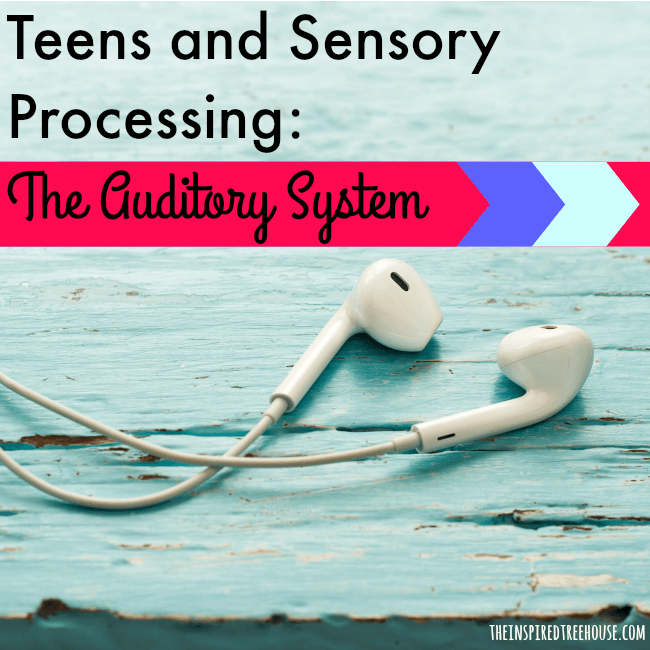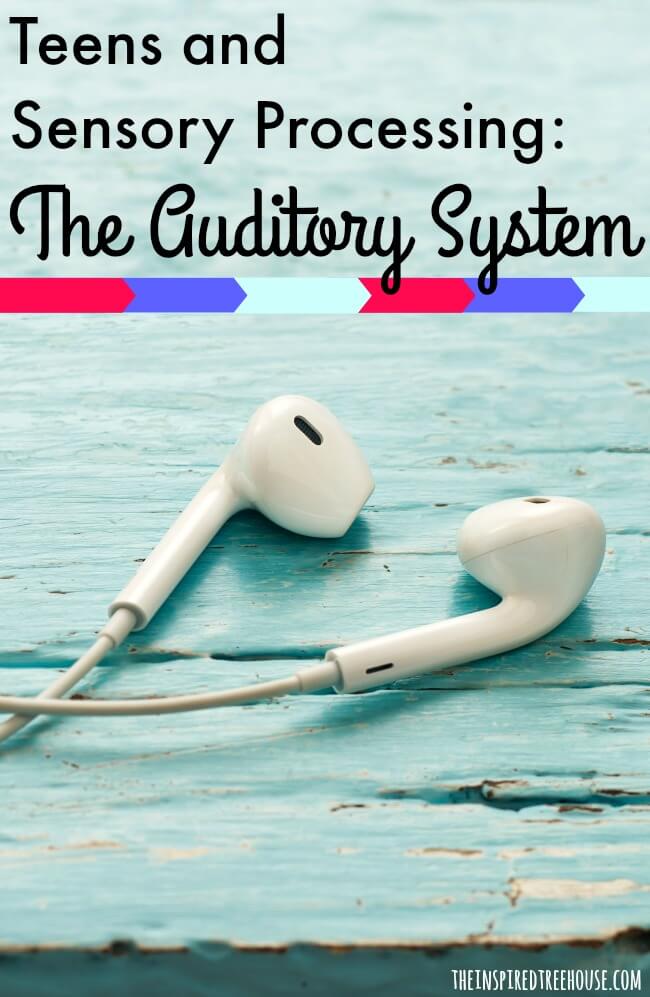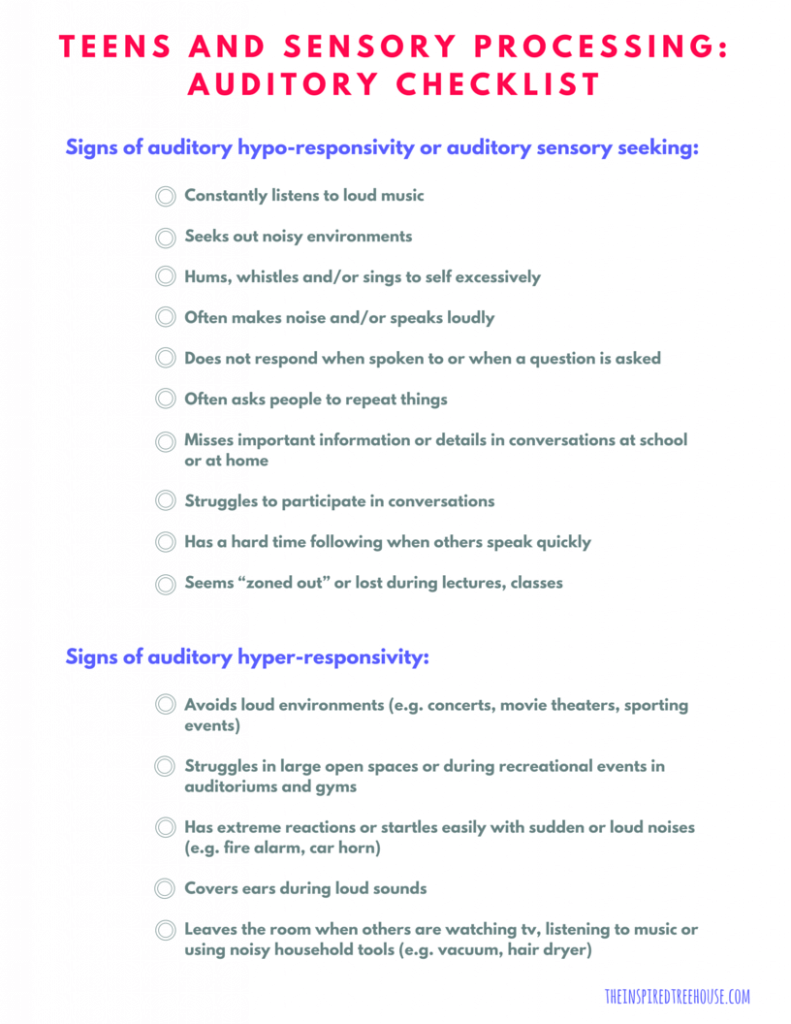Learn more about sensory issues in teens, specifically about the auditory system and how you can support teens with auditory sensory concerns.
This post contains affiliate links. Read more.
We’re so happy to have Courtney Dickinson back with us today to continue our series on Sensory Tricks and Tips for Teens and Older Kids. Today, Courtney is taking on the auditory system!
Does your teen constantly listen to loud music and seek out noisy environments?
Does he tend to avoid loud environments?
Does she appear to miss important details in conversations?
Does he not respond to you when you are talking or asking a question?
All of these behaviors can be related to auditory sensory issues. The auditory system is our sense of hearing. It allows us to hear, listen and respond appropriately.
Sensory Issues in Teens: the Auditory System
Depending on your teen’s unique sensory profile, different types of auditory input may be alerting, energizing, distracting or disorganizing to his or her nervous system. Some kids may be okay with one type of input (i.e. music on radio) and unable to handle other types of input such as vacuum cleaners, lawnmowers, or hair dryers.
If something is off with the auditory system, it can impact social interactions, social participation, learning, and many other aspects of day to day functioning. We can be hypo-responsive or hyper-responsive to types of sensory input. Hypo means that a person tends to under-respond to input and hyper means that a person tends to over-respond.
Some kids and teens who are hypo-responsive to auditory input may also be “auditory sensory seekers.”
Signs of Auditory Hypo-responsivity or Auditory Seeking in Teens
-Doesn’t always respond when others are talking
-Often asks people to repeat things
-Misses important information in class or at home
-Struggles to participate in conversations
-Has a hard time following when others speak quickly
-Seems “zoned out” or is easily lost during lectures, classes
-Hums, whistles and/or sings to self excessively
-Likes to attend events with a lot of noise
-Seeks loud music and noises
-Often makes noise and/or speaks loudly
Signs of Auditory Hyper-sensitivity in Teens
-Covers ears during loud sounds
-Avoids loud noises and/or refuses to attend noisy events such as concerts, movie theatres, parties
-Startles easily with unexpected and/or loud noises
-Does not like fire alarms
-Struggles in large open spaces such as auditoriums and gyms
-Leaves the room when others are watching tv, listening to music or using noisy household tools
-Stays away from noisy settings
Here’s a quick printable checklist of auditory behaviors that may signal an issue with auditory sensory processing in teens and older kids.
As we talked about in the previous post about sensory strategies for teens, an important consideration is how to support older kids’ sensory needs without making them stand out from their peers.
Teens do not want to be different from their friends, and they do want to know the reasoning behind why they are doing things. Helping a teen to become self-aware that auditory input is a problem for him (either because he seeks out additional auditory input, avoids auditory input, or has trouble responding to auditory input) may be the first step to improving this area.
I like to have the teens I work with fill out a the Adolescent/Adult Sensory Profile or a Teen Sensory Tools Survey from Tools for Teens: Strategies to Promote Sensory Processing to help them become more self-aware of their sensory preferences. From here, we can talk about any sensory problem areas.
You could even create your own auditory checklist (using the above info) to have your teen fill out and help him or her become more aware of how they are responding to auditory input. Once they become more self-aware, they hopefully will be more of an active participant with engaging in strategies to support this area of need.
So once we’ve identified the problem areas, how do we help our teens who are struggling with auditory input? What are some good strategies to help teens that are hyper or hypo sensitive or seeking out additional auditory input?
Below are some strategies I have used, or been fortunate enough to observe other wonderful OT’s use over the years, and I hope they are helpful for you too!

Strategies for Teens who are Hyper-sensitive (over-sensitive) to Auditory Input
-Headphones – This may take some exploring and experimenting. Noise cancelling headphones work well for some teens, while others benefit from listening to music with more calming tones, such as classical music.
Wearing earbuds seems to be a constant for most teens, so listening to music or white noise in this way is a great strategy that helps them fit in with their peers too!
-Listening Programs – Explore the use of different listening programs such as Therapeutic Listening or The Listening Program if you are working with someone who has been trained in the use of one of these (generally an OT or SLP, but other professionals may be trained as well)
-Ear plugs – Ear plugs can help block out extraneous noise when taking a test, doing homework or in a noisy environment (I have even had parents wear ear plugs in the waiting room and this seemed to help organize their nervous systems too!)
-Chewing gum or drinking from a water bottle (oral input tends to be very calming and organizing to a hypersensitive nervous system, regardless of the sensory area)
-Use of white noise such as a fan, nature music/sounds, noise machine. White noise can be used via earbuds with apps like Sleep Pillow.
-A constant, consistent rhythm or beat such as a metronome can be calming and organizing for the auditory system
-Use the library for studying or doing homework or create a quiet space at home where extraneous noises can be blocked out easily
-Limit the amount of auditory information, instructions, or steps provided at any one time. Try written or visual checklists instead of or in addition to verbal instructions.
-Provide handouts to go along with auditory information (auditory presentations and lectures may be too much to follow along with)
-Close the door, reduce the volume or find ways to decrease the amount of stimuli
Strategies for Teens who are Hypo-sensitive (under-responsive and/or seeking) to Auditory Input
–Add music – explore with various volumes, rhythms and types of music
-Ask others to slow down, speak up, or repeat
-Make sure teachers are aware of the problem and help them explore ways to provide more visuals and/or hands on learning opportunities to supplement information provided verbally
-Limit the amount of information presented at any one time
-Allow teens to record lectures and other material presented verbally using the Voice Memo app on a smartphone
-Find leisure activities where it is acceptable to make noise or where the environment tends to be noisier: music lessons, recreational sports, etc.
-Establish a nonverbal cue with the teacher to help refocus the teen’s attention when it begins to “fade away” (e.g. a hand signal or other visual prompt)
-Create a volume gauge or chart to provide a visual scale from 1-5, with 1 being a whisper and 5 being yelling as loud as you can. This is a good tool to help teach a teen to self-monitor her voice volume when she may not be aware of how loud she is
-Incorporate vestibular activities. Auditory and vestibular processing are closely related and providing input to one system can stimulate and affect the other. For teens who are under-responding to auditory input, we would want to increase intensity of this vestibular input with activities like swinging, running, skateboarding, in-line skating, skiing, and sledding.
I hope some of these ideas are useful for your teens! This age group can be so tricky to work with and the key is finding strategies that are internally appealing and motivating to them.
The teen has to be motivated to participate and have an understanding of why they are doing what they are doing. I will be following up in a few weeks with proprioceptive and vestibular strategies for teens so stay tuned!
What are your best suggestions for auditory strategies for teens and older kids? Leave a comment below!
Courtney Dickinson
Latest posts by Courtney Dickinson (see all)
- Olfactory and Oral Sensory Strategies for Teens - August 27, 2016
- Tactile Strategies and Activities for Teens and Older Kids - May 25, 2016
- Sensory Issues in Teens: Movement - April 29, 2016


